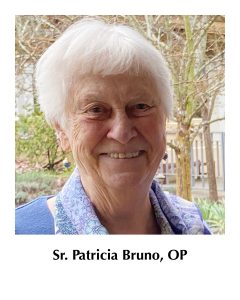- All
- Wisdom
- We Stand on Their Shoulders
- Vocation
- Uncategorized
- Stories Seldom Heard
- Spirituality
- Social Justice
- Prayer
- Peace
- Oneness
- Love
- Letting Go
- Lent
- Joy
- Inspirational Images
- Hope / Healing
- Holy Week
- Gratefulness
- God's Presence
- General News Stories
- Forgiveness
- Finding God
- Faith
- Easter
- Dominican Saints
- Discipleship
- Courage
- Christmas
- Catholic Sisters Week
- Care of the Earth
- Blessing
- Beauty
- Advent
- #justiceOPportunity
Paul’s Epistles: I Corinthians 13: 1-13
Sr. Patricia Bruno, OP

 Recently I received a card in the mail that said in bold letters: “Mail has the possibility of being an event!” It’s true, isn’t it? Cell phones, email, blogs and tweets are all so accessible, inexpensive and efficient that we hardly use “snail mail” any more. As a result, the art of letter writing has almost disappeared. But receiving a letter or a special card from a family member or friend still holds a strong “first place” in my book! It has the power to lift my spirits and make my day. I’ll be honest. I have a shoebox full of special letters I have received over the years.
Recently I received a card in the mail that said in bold letters: “Mail has the possibility of being an event!” It’s true, isn’t it? Cell phones, email, blogs and tweets are all so accessible, inexpensive and efficient that we hardly use “snail mail” any more. As a result, the art of letter writing has almost disappeared. But receiving a letter or a special card from a family member or friend still holds a strong “first place” in my book! It has the power to lift my spirits and make my day. I’ll be honest. I have a shoebox full of special letters I have received over the years.
St. Paul’s Epistles fall into this category of special letters. They are an invaluable gift to us especially in our modern world. They not only tell us about Paul, but also about the communities to whom he was writing. Paul was born around 1 CE He was a contemporary of Jesus. Paul was converted to Christianity between 32 CE – 35 CE. Before his conversion, he was a zealous persecutor of the “followers of the way.” After his conversion, however, he used his zeal to preach the Risen Christ. His first letter was written to the Thessalonians in 51 CE which is about fifteen to twenty years before Mark’s Gospel was written. Paul’s last letter was written to Philemon around 64 CE. There are many letters attributed to Paul, but only seven of them are unanimously accepted as authentically his letters: I Thessalonians, I and II Corinthians, Philippians, Galatians, Romans, and Philemon.
We know more about Paul than any other New Testament author or disciple because of his letters. The Letter to the Galatians tells us of his experience of being called by God while Paul “was still in his mother’s womb.” He then goes on to recount his conversion and meeting of Peter and James (Gal.1:11 – 2:14). In another letter Paul tell us of his missionary journeys (II Corinthians 11: 16 -33). Even though Paul was living and writing in a social and cultural context that is very different from ours, many passages from Paul’s letters are relevant to us.
I Corinthians 13:1-13 is one of his most well-known passages. “If I have all of the eloquence of people and angels, but speak without love, I am simply a gong booming or a cymbal clashing.” The passage goes on to list some of the qualities of love. Love is patient, kind, never jealous, nor deceitful. These are inspiring, qualities, but they are also hard virtues to live. They don’t drop off the tree of life and land in our gardens. Just ask any married couple or reflect on your own family life and/or long-time friendships.
I Cor.13 was the reading friends of mine chose for their wedding, as well as, their recent renewal of vows. My suspicion is that over the years that reading has been key to their relationship as their love has developed and grown in ways they could have never imagined. Love is a great power that can direct our lives, but it is also very demanding. Love does not grow quietly! It often rumbles as it stretches our inner resources or leads us in directions we would otherwise never have chosen. Often it has to coax us into growth. No wonder we gather to bless the beginning of the union between two people on their wedding day but gather as well to bless and celebrate their anniversaries and renewal of vows throughout their lives.
Even though I Cor. 13 is often read at weddings, Paul has something different in mind when he writes his letter to the Corinthians. He is not preparing a wedding ritual. Instead he is responding indirectly to one of the questions that the Christian community in Corinth is asking. Their question refers to the spiritual gifts that members of their community are experiencing. From Paul’s letter, we can tell that the Spirit is very active in Corinth. Some people have reported the gift of tongues, others prophecy, and still others the power to heal the sick (I Cor. 12:4-11). Not unlike modern people, some Corinthians were claiming that their gift was more important, more valuable than another person’s gift. Paul quickly discourages this type of hierarchical thinking. He says, “There is a variety of gifts, but always the same Spirit” (ICor.12:4). Each gift is needed. None is better than another because the Spirit is the source of every gift. To underline his argument, Paul draws an analogy. Alluding to the different parts of the human body, the eye, ear, hands, and feet, he reminds us that each part has its unique function. Each is very important but works in union for the good of the whole.
Paul is a good teacher. He uses the Corinthians’ concerns about the importance of the different gifts of the Spirit to discuss what really is important in the sight of God. Paul says: to speak with the eloquence of angels, to understand the mysteries of God, to have faith that could move a mountain, to be able to offer one’s own body to be burned, is worth nothing without love (I Cor. 13:1-3). Very powerful words! In Paul’s words, without love, our actions, no matter how noble they might seem, will do no lasting good.
Paul wants the Corinthians and us to understand as fully as possible what love in the Christian context means. To help us “get it,” he describes what loving acts look like. “Love is always patient and kind; it is never jealous; it is never boastful or conceited; it is never rude or selfish; it does not take offense and is not resentful. Love takes no pleasure in other people’s sin, but delights in the truth; it is always ready to excuse, to trust, to hope, and to endure whatever comes.” Paul’s description of love is poetic and like poetry requires a careful read. It would be worth reading this section a few times — slowly — because, like poetry, it needs to be unpacked through the lens of our life experiences.
As we reread the passage, probably the words that stand out for us are “always” and “never.” It’s hard to always do the right thing and never fall short. It’s also hard to live all of these virtues perfectly. However, even though we realize this, it doesn’t stop us from trying especially since we know that it is through God’s grace that we have the power to change and grow in love. With this in mind, we might identify one virtue that we find challenging and focus on developing that one gift of the Spirit this month. Perhaps we find ourselves impatient with one of our neighbors or family member. We might boast about our own achievements and gifts in a way that minimizes other people’s accomplishments. Maybe we are plagued with feelings of anger or jealousy that have stirred discord in the office or at home. Change is hard. Yet, for those of us who strive to live love well even our failures can be our teachers. They reveal to us a truer understanding of ourselves. They remind us of our profound need for God. When we acknowledge our failures and work to change them, we experience the transformative power of Love firsthand.
For Paul love is expressed through words and daily actions. We can identify those who love God by how they live and the choices they make. Some of our choices are more deliberate than others. A young friend of mine whom I hadn’t seen for some years was describing where he and his family were living. His wife and he intentionally chose the neighborhood because of its ethnic, economic, and racial diversity. They wanted their children to experience a broader worldview. They hoped that their children would grow to have strong friendships with people of other cultures, religious traditions, and backgrounds. “Our real hope,” he said, “is that they will understand, first hand, that Jesus’ command of love goes beyond our immediate family.”
Paul’s words based on Jesus’ teachings draw us into a world where love has the power to break all barriers of selfishness and sin. Love is a powerful mystery. Living it well means being willing to engage in the struggles that love demands. It means turning to God who is Love: the source of our strength in our weakness, wisdom in our doubts, and courage when we feel defeated.
Meister Eckhart, our dear Dominican theologian and mystic, puts it this way.
We aught not to think of building holiness upon action;
we aught to build it upon a way of being,
for it is not what we do that makes us holy,
but we aught to make holy what we do.
Summer is a good time to do some reflecting on our own lives: to examine our choices and pray for the strength and courage to make wise decisions. Discussing our feeling and difficulties with others can also help move us in the right direction and effect healing and forgiveness. All of these actions are the promptings of grace and are God’s way of inviting us once again into a deeper relationship.
